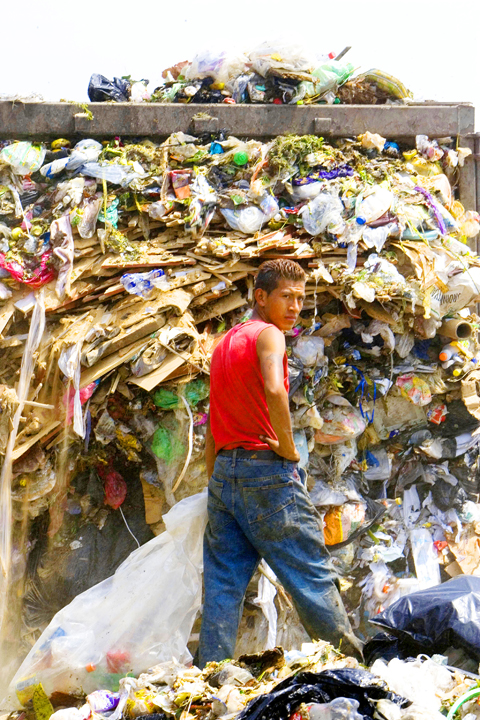Mexico City wants to turn one of the planet’s biggest and messiest waste management systems into the greenest in Latin America, if not the developing world.
A newly formed Waste Commission is working to build four state-of-the-art processing centers in the next four years to recycle, compost or burn for energy 85 percent of Mexico City’s trash — compared with about 6 percent recycled today. If it works, it would put this sprawling, polluted metropolis in a league with San Francisco, the Netherlands and other top recyclers, and first among developing cities, where the recycling rates mostly hover around 10 percent.
“The whole concept of recycling is very new in Latin America,” said Atiliano Savino, president of the International Solid Waste Association.

PHOTO: AP
While many places are good at recycling one thing, such as aluminum, Savino said he had never seen a city revamp its recycling program on this scale in so little time. US and European cities that now have recycling rates of more than 50 percent began decades ago.
NO CHOICE
But Mexico City has no choice. The federal government proposed to close the city’s main landfill this month, saying the 50 million-tonne dump has become too full and leaches contamination. Scientists dispute that and the closing has been delayed by a city appeal in federal court for an extension. Yet waste management officials know that soon much of Latin America’s largest metro area will be forced into expensive, temporary alternatives for dumping trash.
It will take more than technology to recycle most of the 12,500 tonnes of trash the mega-city produces daily. As in much of the developing world, Mexico City residents aren’t accustomed to separating their garbage.
But Fernando Menendez, the dapper, silver-haired Waste Commission director, says naysayers need only look at the success of his other major environmental project. No one thought he could get Mexico City residents out of their cars to cut air pollution, either. But his Hoy No Circula campaign now idles at least 1.6 million cars a week.
“Nobody has ever done anything like this,” Menendez said of shutting down what he calls the world’s biggest landfill. “But it has to work. There’s no other option.”
The Bordo Poniente dump was built on a dry lake bed on the northeast edge of the city in part to handle the rubble from the devastating 1985 earthquake. It now takes about 700 truckloads of unsorted rubbish a day.
SORTING TRASH
The city has required residents to sort trash since 2003, but without providing the infrastructure to handle it. Ninety percent of garbage trucks lack separate compartments for organic and inorganic waste. Thirteen transfer stations are supposed to process waste separately. But on a recent afternoon at a mid-sized center, three men were shoveling tree branches into a pit with plastic foam cups.
That’s where the enterprising informal economy takes over. Mexico City’s garbage workers union officially employs 17,000 and at least 8,000 more unofficially. Paid drivers and so-called volunteers make extra cash collecting “tips” from customers and selling aluminum and cardboard from their routes. Some union members rake in as much as three times their wage.
Meanwhile, just outside the Bordo Poniente, garbage pickers, including some children, sift through waste on fast-moving conveyer belts with their bare hands in a foul and dangerous open-air pit.
The Waste Commission plans to replace the ad-hoc system with new processing centers — about 180 million pesos (US$13 million) apiece — that by 2012 will recycle 20 percent of Mexico City’s garbage, compost 20 percent more and burn another 45 percent for energy.
As of November, only one center, in the rural southern delegation of Tlahuac, had been approved. Menendez says he is negotiating with private investors to finance the other three, while the Tlahuac center will be paid for with public funds.
The government also will harvest methane gas from the Bordo for energy to power the subway and light homes.

‘HYANGDO’: A South Korean lawmaker said there was no credible evidence to support rumors that Kim Jong-un has a son with a disability or who is studying abroad South Korea’s spy agency yesterday said that North Korean leader Kim Jong-un’s daughter, Kim Ju-ae, who last week accompanied him on a high-profile visit to Beijing, is understood to be his recognized successor. The teenager drew global attention when she made her first official overseas trip with her father, as he met with Chinese President Xi Jinping (習近平) and Russian President Vladimir Putin. Analysts have long seen her as Kim’s likely successor, although some have suggested she has an older brother who is being secretly groomed as the next leader. The South Korean National Intelligence Service (NIS) “assesses that she [Kim Ju-ae]

In the week before his fatal shooting, right-wing US political activist Charlie Kirk cheered the boom of conservative young men in South Korea and warned about a “globalist menace” in Tokyo on his first speaking tour of Asia. Kirk, 31, who helped amplify US President Donald Trump’s agenda to young voters with often inflammatory rhetoric focused on issues such as gender and immigration, was shot in the neck on Wednesday at a speaking event at a Utah university. In Seoul on Friday last week, he spoke about how he “brought Trump to victory,” while addressing Build Up Korea 2025, a conservative conference

DEADLOCK: Putin has vowed to continue fighting unless Ukraine cedes more land, while talks have been paused with no immediate results expected, the Kremlin said Russia on Friday said that peace talks with Kyiv were on “pause” as Ukrainian President Volodymyr Zelenskiy warned that Russian President Vladimir Putin still wanted to capture the whole of Ukraine. Meanwhile, US President Donald Trump said that he was running out of patience with Putin, and the NATO alliance said it would bolster its eastern front after Russian drones were shot down in Polish airspace this week. The latest blow to faltering diplomacy came as Russia’s army staged major military drills with its key ally Belarus. Despite Trump forcing the warring sides to hold direct talks and hosting Putin in Alaska, there

North Korea has executed people for watching or distributing foreign television shows, including popular South Korean dramas, as part of an intensifying crackdown on personal freedoms, a UN human rights report said on Friday. Surveillance has grown more pervasive since 2014 with the help of new technologies, while punishments have become harsher — including the introduction of the death penalty for offences such as sharing foreign TV dramas, the report said. The curbs make North Korea the most restrictive country in the world, said the 14-page UN report, which was based on interviews with more than 300 witnesses and victims who had